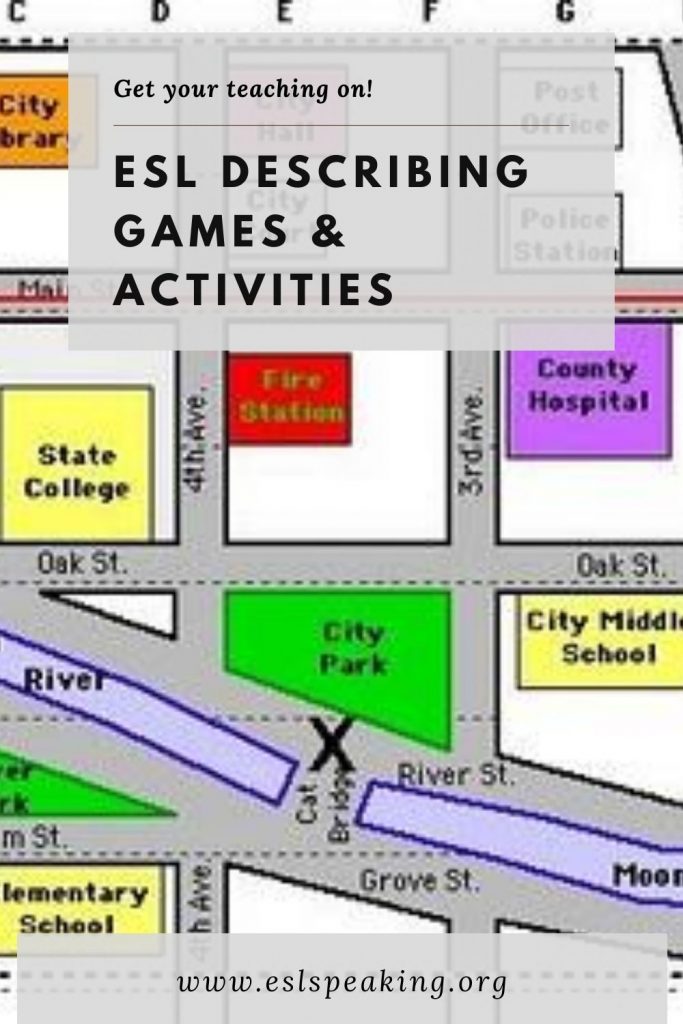If you’re looking for some of the best describing games, then you’re certainly in the right place. Stay tuned for the best describe the word ESL activities, along with lesson plans, worksheets and more.

Describe games
Describe Games and Activities
Let’s get into the best describing words games for English learners.
#1: Describing Words Board Game
In real life, I love to play board games which is why I like to bring some into my classroom as well. It’s easy to make your own for just about topic, grammatical point or vocabulary set, including describing words.
In this case, fill the board with common objects that students might know. Then, when they land on that square, they have to say 1-3 (depending on the level) words or statements about that object. For example, pencil:
- It’s made of wood.
- A pencil is hard.
- It has a sharp point.
If the student can come up with the required words/statements, they get to stay on that spot. Find out more about how to make your own ESL board games:
www.eslspeaking.org/esl-board-games
#2: Speaking Bingo Describing Activity
A nice way to give students some practice with describing things is to play this speaking Bingo game. Regular Bingo is fun but it doesn’t have a lot of educational value to it. Instead of just saying the word, I like to describe it instead to make it a more challenging listening activity, as well as vocabulary one.
Better yet, it’s possible to have students describe the words instead of you! Try it out:
www.eslspeaking.org/esl-speaking-bingo
#3: Using Relative Clauses to Describe Things or People
Using a relative clause (He is a person who…) or a reduced relative clause (This is the man I saw…) to describe people or things is very common. In this activity, students have to give hints to other people in their group about a secret object or person. The other students have to guess who or what is it.
Have a look here to find out more:
www.eslspeaking.org/relative-clause-speaking-activity
#4: ESL Comparatives Quiz
Comparative adjectives are a nice way to describe a lot of things! Have a look at this simple online quiz to try out with your students:
#5: Guessing Game Warm-Up
This is a simple party game that I’m sure you’ve played before. You get a sticky note with a secret person or thing on it and then have to ask questions to the other people at the party to try to figure out what it is.
To work on describing things, I play this game with a bit of a twist. Instead of asking questions, I get people to give hints to the person. For example, someone might have Barrack Obama at their secret person. They could give hints such as:
- It’s a man
- He’s American
- He’s a politician
- He was a former president
- Etc.
Try it out with your students:
www.eslspeaking.org/describe-something-guessing-game
#6: Taboo Describe Game
Here’s another party game that you may have played before. Traditionally, there is a secret word that you have to describe but you can’t use a list of other closely related words.
I’ve adapted it for my English learners to make it slightly easier. They still have to describe a secret word but I don’t use the banned list of related words. Find out more here:
www.eslspeaking.org/esl-speaking-game-for-kids-adults
p.s. It can be super helpful to laminate the words to recycle from class to class. Here are some top options: Best laminators.
#7: Just a Minute
If you want to challenge your students, try out this speaking activity. Bring some different objects into the classroom and put students into pairs. Take out the first object and set a timer for one minute. One person in each group has to describe the object for one minute without stopping. Then, use a different object and the other person tries the same task.
It’s also possible to do this activity without objects but instead use things like:
- Hometown
- Family
- Favourite thing
- Most delicious food
- Etc.
Have a look here for more information:
www.eslspeaking.org/just-a-minute-game-esl-speaking
#8: Hot Potato Describe Game
This is a fun game to try out if you want to inject some excitement into the classroom. Students pass around the potato (or another object) until the timer goes off or the music stops. Whoever is holding the potato when this happens has to do a task of some kind.
In this case, show the student a flashcard or other object and have them make 1-3 statements (depending on the level) to describe the object. For example, a cat.
- It’s black and white.
- It has soft fur.
- It looks sleepy.
Find out more about this fun ESL game here:
www.eslspeaking.org/hot-potato-esl-speaking-game-for-kids
#9: Word Association
This activity is a nice way to focus on word families. Have a look here for all the details:
#10: Puzzle Finder Activity
This is a fun ESL speaking and listening activity that focuses on teamwork as well as describing common vocabulary words. It’s a flexible activity that can be adapted to many different kinds of things. Basically, students have to describe their puzzle pieces to others to help decide if they have a match. Check it out:
www.eslspeaking.org/puzzle-finder-esl-ice-breaker
#11: TOEIC Speaking Test: Describe the Picture
Most English proficiency speaking tests have a section where students have to describe a picture of some kind. There is certainly specific vocabulary related to this that can help our students get the best possible score. If I’m teaching students who are likely to take these kinds of tests in the future, I like to teach them how to describe a picture by doing some sample tests. Here are a few to try out:
www.eslspeaking.org/toeic-speaking-mini-tests
#12: Current Events Presentation Project
With some of my more advanced students, I like to do a current events presentation project. It’s challenging because students often have to learn a bunch of new vocabulary words that they may not be familiar with because they often aren’t found in ESL textbooks.
As part of the project, they have to describe the event and then talk about why it’s important. It’s a describing activity but of a different sort than most of the other ones on this list. Try it out and I think you’ll like the results as much as I did:
www.eslspeaking.org/current-events-presentation-project
#13: Describing Places
A common topic that involves lots of adjectives and descriptions is for places. For example, describing a city. Here are some of the best ideas for this popular unit that is found in most ESL textbooks:
www.eslspeaking.org/teaching-places
#14: Song for Describing People
When I teach kids, I always like to use some songs and chants in my classes. They help make grammar and vocabulary far more memorable and I sometimes even catch students singing along to them between classes. This always makes me feel like I’ve done a good thing!
Have a look on YouTube and you’ll be able to easily find something for the age and level of students that you teach.
#15: ESL Adjective Games and Activities
Using adjectives are necessary for describing things. Here are some of the best ESL adjective activities to consider trying out:
www.eslspeaking.org/esl-adjective-games
#16: What are you Cooking? (Describing Food)
This is an engaging 4-skills ESL activity that’s perfect for adults. Students have to make a 3-course menu from ingredients chosen by another group. Then, they have to make a presentation to try to convince others that their menu is the best. This is where descriptive words come in! Have a look here to find out more:
https://eslspeaking.org/what-are-you-cooking-4-skills-esl-activity/
#17: English Comparative and Superlative Adjectives
These kinds of adjectives are very helpful for describing just about anything. A comparative compares two things (The dog is bigger than the cat) while a superlative talks about only one thing (That’s the fluffiest cat in my neighbourhood). There are lots of interesting comparative/superlative activities to try out with your students:
www.eslspeaking.org/esl-comparative-superlative-activities
#18: Describe and Draw a Picture
This is a fun activity for kids as well as adults that usually has some hilarious results. It’s for describing people ESL. Find some pictures of monsters or aliens. Then, one student has to describe what they see to the other student who has to draw it. When they’re done, they can compare the two pictures. Find out more:
www.eslspeaking.org/draw-a-picture

Describe the word game
#19: Picture Prompt
This is a nice warmer activity or to use as a review at the end of class. Find an interesting picture that has a number of target vocabulary words. Then, elicit some of those from the students. What you can do with this depends on the level of the students. Beginners may say a single word while more advanced students can make sentences. Or, even write a story based on what they see. Check out all the options:
www.eslspeaking.org/picture-prompt
#20: Flip-Chart Vocabulary Review Describe Game
This is a fun review game that helps students practice describing the word. The first team chooses one person to be in the hot seat. Then, the team has to describe the secret words to that person who guesses what it is. They try to get as many words as possible in a minute. I generally allow one pass per round. I play 3-5 rounds with different people in the hot seat. Have a look here for more information:
www.eslspeaking.org/vocabulary-review-game-for-kids-and-adults
#21: Postcards ESL Writing Activity
On a postcard, people often describe places or events. Check out this simple activity:
#22: Show and Tell
This isn’t just for kids! Show and Tell is a fun ESL activity for all ages. I have students bring in one of their favourite things or a picture/PowerPoint slide if it’s too big. Then, they have to describe to the class about their thing in 1-2 minutes. After that, I have a question/answer time. It’s fun and interesting to see a bit about the student’s hobbies or home life. More information here:
#23: Dictogloss
This is a challenging listening activity for higher-level students. Find (or write) a passage filled with lots of descriptive words. It might be someone talking about their hometown, or their favourite hobby.
Then, put students into pairs and read it out at a faster than normal pace. Students have to take notes and then try to recreate what they heard. Read it again and students do the same thing. After that, they can compare what they have with the original. Find out more details here:
www.eslspeaking.org/dictogloss-esl-activity
#24: Describing Yourself Toiler Paper Icebreaker
You’ve maybe done this icebreaker activity before? You have to take a certain number of toilet paper squares and then say a true statement about yourself for each one that you have. I like to mix things up a bit and allow some follow-up questions too. Check it out:
www.eslspeaking.org/ice-breaker-speaking-activity
#25: ESL Clothes Quiz
Try out this fun game that describes clothes:
#26: I’m an Alien
This is a fun describe game that you can use with kids. Pretend that you’re an alien from another planet and don’t know anything about happens on Earth. Students have to tell you everything you need to know to survive. To focus on describing words, pretend that you don’t know what basic things and students have to describe these things to you. Try out this fun ESL activity:
www.eslspeaking.org/im-an-alien-an-esl-speaking-activity-for-kids
#27: ESL Describing Game
Write down 10-20 words randomly on the whiteboard (more ideas here: Whiteboard Activities). They should be related to a certain topic that you want to review (sports, animals, food, etc.). Then, put students into pairs and the first student has to choose a word and describe it to their partner. When their partner guesses, they switch roles and play again.

Games where you describe a word.
#28: Five Senses Vocabulary Activity
Try out this versatile activity that can be done either through speaking or listening and alone or in groups. Bring in a common object like an orange and then students have to think of descriptive words related to the 5 senses to describe the object. It’s challenging but fun and I think your students will enjoy it as much as mine do! Find out more:
5 Senses ESL Vocabulary Activity
#29: ESL Fruit and Vegetable Quiz
Check out this simple online quiz that describes fruit and veggies:
#30: Mystery Box
Place an object inside a box without showing it to the students. Describe the object using adjectives, size, shape, and other relevant details. Students then guess what the object is based on the description.
#31: Descriptive Bingo
Create Bingo cards with various adjectives. Call out different nouns, and students mark the corresponding adjectives that could be used to describe those nouns on their cards.
#32: Describe the Odd One Out
Show students a group of objects, with one that doesn’t belong based on certain criteria (e.g., size, color, purpose). Students describe why they think the odd one out is different.
#33: Travel Brochure
Assign students a country or city and have them create a travel brochure describing the attractions, culture, and experiences using descriptive language.
#34: Describing Role Play
Prepare cards with roles or occupations. Students draw a card and take on that role while describing their daily routine or work using relevant vocabulary.
#35: Descriptive Story Writing
Provide a prompt or an opening sentence for a story. Students take turns adding sentences, focusing on using descriptive language to bring the story to life.
#36: Adjective Scavenger Hunt
Give students a list of adjectives. They walk around the classroom or school, finding objects that match each adjective and then describing them.
Describing Words Worksheets
Describing worksheets are perfect for an in-class assignment or for homework. Here are some of the best ones to consider:
Describing Words Lesson Plans
If you’re a teacher, then you’ll know what a huge time-saver it can be to have ready-made lesson plans at your fingertips. Here are some of the best ESL describing lesson plans to check out:
Teaching Description Words FAQs
There are a number of common questions that people have about teaching words to describe things. Here are the answers to some of the most popular ones.
What are describing words?
Describing words, also known as adjectives, provide information about nouns by adding details like color, size, shape, and more.
How do you teach adjectives effectively?
Use real-life objects, pictures, and examples to demonstrate how adjectives modify nouns and make sentences more descriptive.
What’s a simple way to introduce adjectives?
Start with basic adjectives like “big,” “small,” “happy,” and “sad.” Show objects and ask students to describe them using these words.
Can you give an example of using describing words in a sentence?
“The tall giraffe ate the green leaves.”
What’s a good way to expand students’ adjective vocabulary?
Create word banks with related adjectives (e.g., synonyms for “happy” – joyful, delighted) to help students choose varied words.
Can songs or rhymes help teach descriptive words?
Incorporate songs that use descriptive words. Rhymes can make learning adjectives more engaging and memorable.
What’s the importance of teaching description words?
Description words enhance language by adding depth and detail. Teaching them helps students express themselves more vividly.
How can I encourage students to use adjectives in their writing?
Assign creative writing tasks that require them to incorporate a certain number of adjectives, encouraging them to think creatively.
How do you teach the order of multiple adjectives before a noun?
Teach the sequence: Opinion, Size, Age, Shape, Color, Origin, Material, Noun (OSASCOMP). For example, “a beautiful, large, old book.”
Can descriptive words be used in sentences without nouns?
Yes, descriptive words can stand alone in sentences to express opinions or feelings, like “Interesting!” or “Great!”
Did you like these ESL Describe Games?
- Amazon Kindle Edition
- Bolen, Jackie (Author)
- English (Publication Language)
- 71 Pages - 10/26/2015 (Publication Date)
Then you’re going to love this book over on Amazon: 39 ESL Vocabulary Activities for Teenagers and Adults. The key to better English classes is a wide variety of interactive, engaging and student-centred activities and games and this book will help you get there in style.
Pick up a copy of 39 ESL Vocabulary Activities to keep on the bookshelf in your office to use as a handy reference guide. Or, take the digital version with you to your favourite coffee shop for some lesson planning on the go. Whatever the case, get ready for some ESL teaching awesome in your life,
Head over to Amazon to find out more about the book today:
Have your say about these Describing Games and Activities
What’s your top pick for a describe the word game or activity? Is it one of the options from this list or do you have your eye on another one? Leave a comment below and let us know what you think. We’d love to hear from you.
Also be sure to give this article a share on Facebook, Pinterest, or Twitter. It’ll help other busy English teachers, like yourself, find this useful resource?
Last update on 2025-06-12 / Affiliate links / Images from Amazon Product Advertising API






Leave a Reply